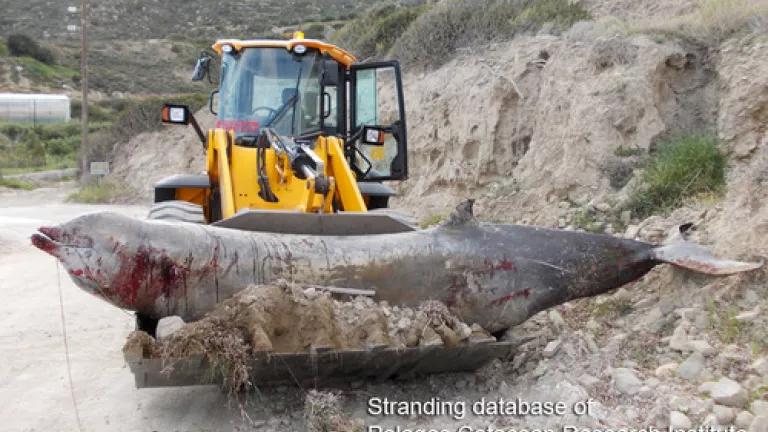This Week in Whales: Monday Victory for Anti-Whaling in the Antarctic; Tuesday Sanctions Against Iceland for Whaling; Wednesday US Navy Implicated in Mass Stranding of Whales in Greece; Thursday Noise Guidelines for Shipping Industry; What a Week!

- The best way to start a week is with a victory—on Monday, the ICJ ruled that Japan’s whaling program in the Antarctic is illegal. Despite the ICJ’s lack of enforcement power, Japan has already indicated that it will abide by the ruling. Check out my colleague Taryn Kiekow Heimer’s blog on the ruling.
- The good news kept rolling in. On Tuesday, President Obama upped the pressure on Iceland to end whaling and halt its trade in whale products by instituting additional diplomatic sanctions and ordering the monitoring of Icelandic companies that engage in commercial whaling and trade in whale parts. Iceland killed 35 minke whales and 134 endangered fin whales in 2013 alone. Fin whales—the world’s second largest animal and listed as an endangered species—are hunted predominately for export to the Japanese market, and a massive shipment of 2,000 tons of whale products left Iceland for Japan just last month. Alas, as my colleague Taryn Kiekow Heimer explains, the President should have done more—utilizing targeted trade sanctions—to hit Icelandic seafood industry players that are directly tied to Iceland’s whaling industry. The administration’s instituted diplomatic sanctions in the past and they haven’t worked yet. Time to get tough.
- Wednesday brought tragic news out of Greece: reports of a mass stranding of Cuvier’s beaked whales on the southeastern shore of Crete. As my colleague Michael Jasny explained, up to seven whales stranded and one died while the U.S. and other navies played war games somewhere offshore. Responders on the scene are worried that the naval operations may have caused the strandings. While such strandings are atypical for Cuvier’s beaked whales, numerous standing events have occurred concurrent with Navy training in Greece. One of the problems with the US Navy’s potential involvement with this tragedy is the fact that its harm of marine mammals in the Mediterranean is illegal. Without a permit from the National Marine Fisheries Service, the Navy violates the Marine Mammal Protection Act when it harms marine mammals in international waters. I spoke to Deirdre Wilson on the LA Talk Radio program, Out of the Blue, about the Navy’s use of sonar and NRDC’s campaign for common-sense protective measures during training and testing. News like this coming out of Crete is further evidence that the Navy must do more to protect whales and dolphins during its exercises.
To demand that the Navy protect whales, please go here.
- Finally on Thursday, back to some good news. After five long years, the International Maritime Organization (IMO) released voluntary guidelines intended to reduce underwater noise from commercial ships globally. Ocean noise has been a growing problem for the world’s whales, dolphins and marine mammals as increased shipping traffic and other factors have impeded the animals’ ability to communicate, avoid predators, find mates and maintain their awareness in the darkness of the sea. NRDC worked with many partners to put noise-quieting on the IMO’s work agenda, and then helped shepherd the guidelines through approval. As my colleague Michael Jasny wrote, these guidelines to reduce underwater noise on shipping vessels are a milestone in the fight against ocean noise pollution.
An amazing week in whales.

